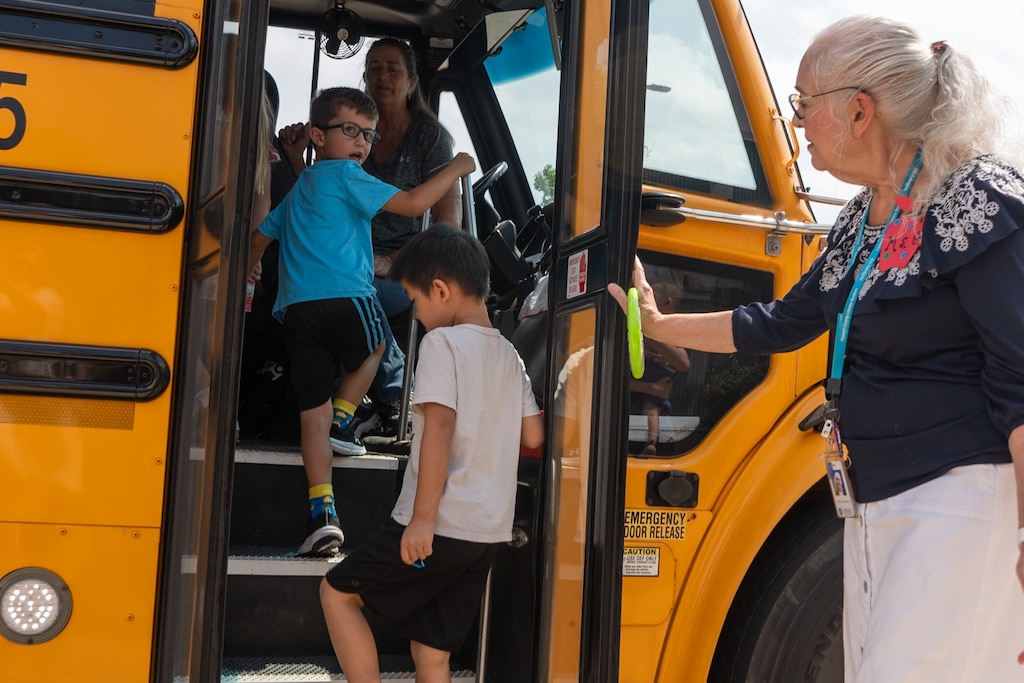Gisele Gentile was nervous about sending her pandemic baby off to kindergarten.
The stay-at-home mom gave birth just months before COVID-19 plunged the world — including new parents — into isolation. Her son, Harry, spent “24 hours a day, every day” in his earliest years with just mom and dad.
As a result, he is a “stage 5 clinger” who wants to be around mom all the time, Gentile said. That’s why she’s been pleasantly surprised by his first three weeks of kindergarten.
“He’s not clinging to me. He’s not crying at drop-off,” she said. “When he gets home, he tells me that he loves kindergarten and it’s so much fun, but it’s hard work.”
This year, Harry joins tens of thousands of Maryland kids whose most formative years were shaped by the pandemic and are now entering pre-K 4 and kindergarten classrooms. As in every other year, kids will come to school with varying early learning experiences, which can impact their adjustment to the classroom.
This year’s youngest scholars were born into a world of uncertainty that mostly impacted kids’ social development, which is linked to traditional academic learning, said Jimmy Venza, executive director of The Lourie Center for Children’s Social and Emotional Wellness.
Read More
Though they’ve been dealing with pandemic fallout for years, teachers are zeroing in on building those social emotional skills back up. If they do it right, this could be a fresh start for kids after years of educators batting back pandemic-era declines.
“It’s to our children’s peril if we’re not taking into consideration the context in which they were born,” Venza said.
Though it was older kids who got sent home from school, babies’ lives were still disrupted by the pandemic. The best way for kids to grow is to have nurturing, supportive relationships with adults, Venza said, and the way COVID impacted those bonds can bleed into how kids handle school.
“The first three years in particular are so critical,” Venza said. “Being an infant at a time that your caregivers are maximally stressed, that’s a disruptive experience for providing what children optimally need.”
Instructors for Howard County Library System children’s programs, including one that helps prepare kids for kindergarten, have noticed “changes over the past few years regarding social interactions, an understanding of personal space, sharing, waiting your turn,” Cari Gast, head of children’s curriculum, said in an email. Kids between ages 3 and 5, some of whom are hesitant to interact with others, are going to the library before and after school for additional academic and social emotional support, such as with expressing emotions constructively, she added.

In her Midtown Academy classroom, Madeline Miller takes more time in the morning with her 18 kindergartners. She helps kids turn to face their friends so they can be “full body listeners” and works on skills like empathy by asking students how they can be nice to someone that day. She reminds students of the classroom rules and to treat others the way they want to be treated.
“Lots of social and emotional skills are taught in the beginning of the day,” she said. “I really think that kindergarten is going to have a successful year.”
By the end of kindergarten, kids should ideally be able to follow directions and routines quickly and line up without reminders. Academically, they should know their letters, numbers and be able to add and subtract with small quantities, said Ashley Smith-Rochford, an early elementary educator who now teaches those skills as an adjunct professor.
Smith-Rochford was teaching first grade in 2020 and thinks kids who were forced to do their foundational early learning years virtually are “the ones that missed the most important learning time,” and should now be getting extra help and attention. She noticed kids finally starting to enter first grade with typical skill sets in 2023, after they’d had a full, normal year of kindergarten.
“If you miss it in kindergarten, first grade, second grade, it’s very hard for the rest of your schooling,” said Smith-Rochford, who added that teachers should focus on kids’ growth and abilities rather than learning deficits.
Principal Kimberly C. Davis said Midtown Academy began implementing a program last year that was chosen to help older kids struggling with the effects of COVID isolation, though it will also help younger kids just now starting school. Kids who spent more time alone staring at screens need help learning how to speak to and treat one another so they can form healthy friendships.
Midtown is teaching kids in small groups so they don’t get as overwhelmed. Years past initial pandemic disruptions, Davis feels like “we have the hang of it now.”
“We are all about extra patience and grace for our students and our families and for staff members,” she said.
Parents may need the extra support. Davis said that normally, by the end of the first week of school, parents are able to drop their kids off and keep it moving. But this year, at the beginning of the third week, parents were still hanging in the hallway to keep an eye on their kindergartners.
Gentile thinks being a first-time mom in 2020 made her much more cautious, especially if Harry ever got sick. Limited access to medical appointments during COVID meant his hearing loss was detected late, which delayed getting him hearing aids and further delayed his speech development.
His younger brother, William, was born in early 2022.
“My second is definitely a lot more independent and not as clingy as Harry was,” Gentile said. “We were able to get out and do mommy-and-me classes early, and go to the library, and go visit family right away. And with Harry, we couldn’t do any of that until he was well over a year old.”
Harry still struggles with some social cues compared to his brother, like not recognizing when others don’t want to play with him. But getting into preschool early is definitely helping him in kindergarten, Gentile said.
To achieve strong outcomes for students like Harry, the best path forward is supporting relationships between kids and both their teachers and parents, Venza said.
“The whole joy of early intervention is whatever’s happened, even if it’s really hard stuff, we know what helps,” he said.
About the Education Hub
This reporting is part of The Banner’s Education Hub, community-funded journalism that provides parents with resources they need to make decisions about how their children learn. Read more.



Comments
Welcome to The Banner's subscriber-only commenting community. Please review our community guidelines.